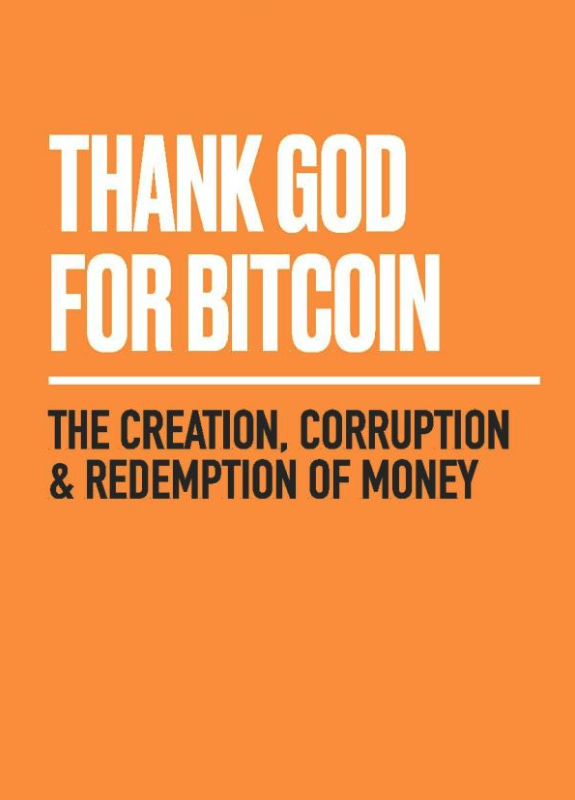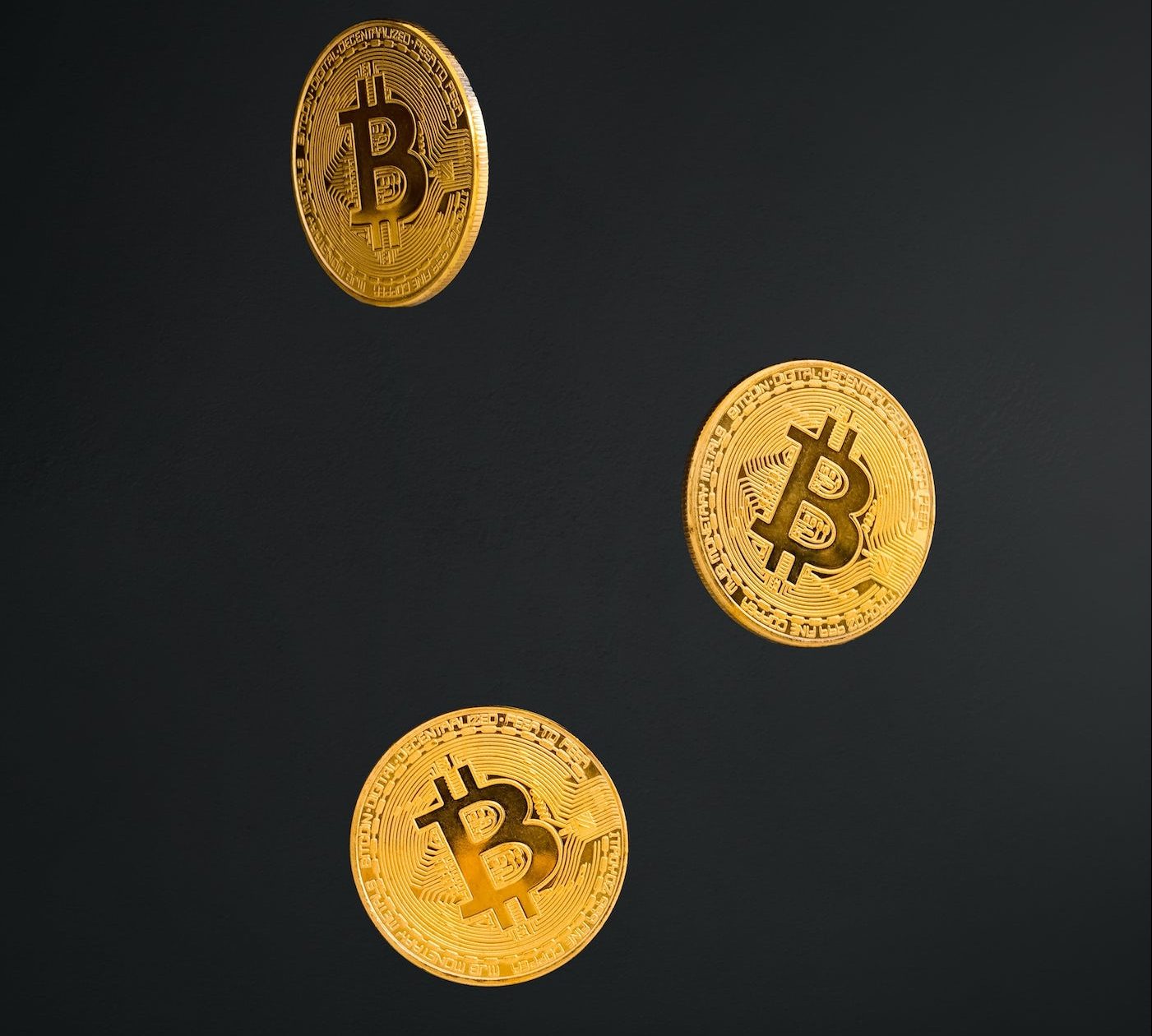
Rating: 8/10
Intro
What is money? Why does it exist? What is it designed to do? How does it work?
Little has been written about what money actually is and whether or not money itself is moral. Thank God for Bitcoinexplores what money is and the ways in which the current monetary system is broken and what can be done to fix it.
Is there a more moral money out there? This book talks about money and bitcoin from a Christian moral perspective.
My aim with this post isn’t just to summarize the main thesis of Thank God for Bitcoin, but also to show Christians and people who are not familiar with Bitcoin, what it is and why it matters — a starter guide for people wanting to know the basics.
*Note learning about an entirely new monetary system is not a small undertaking and requires some time and effort to understand.
John Oliver once quipped: “Bitcoin is everything we don’t understand about money, combined with everything we don’t understand about computers.”
“And I sincerely believe, with you, that banking establishments are more dangerous than standing armies; and that the principle of spending money to be paid by posterity, under the name of funding, is but swindling futurity on a large scale.” – Thomas Jefferson
Thank God for Bitcoin Summary
We cannot understand Bitcoin’s significance without understanding that our money is broken. It is much easier to grasp a thing’s importance after understanding the need it fulfills. This is why many people remain uninterested in Bitcoin; they don’t realize there’s a problem to be fixed.
Money is a gift from God and it was intended to store the value of work across time and space. Money is quite simply the most tradable asset in any society. Fiat is immoral money because of the ease with which it can be created and used for theft via inflation. “When our money is stolen, our labor is stolen. When our labor is stolen, our time is stolen. And when our time is stolen, our life is stolen. The stealing of life is what we call slavery.” Bitcoin is non-inflatable money in a world where wealth is continuously stolen by inflation.
What we have today is a central-bank-controlled fiat monetary system. The word ‘fiat’ means ‘by decree.’ Fiat money is not backed by anything except faith in a government’s decree. USD has no value outside of the current monetary system. Governments like fiat money because they can print money whenever they need – to pay off debt, fund a war, or whatever they like. Printing more money is cheap, easy to obfuscate, and its negative consequences generally don’t show up for a while. This is why fiat is immoral. It’s hard to tell that the community is being stolen from.
When paper currency is backed with gold, this is called a gold standard. In 1971, when the government abolished money’s link to gold and it placed the world on a path to financial serfdom. The integrity of money was removed as it no longer was backed by anything. It brought us into the age of debt-based money — fiat currency, which allows for limitless inflation. Once it sets in, inflation has only on outcome historically: dilution of currency into worthlessness. Since breaking its peg to gold in 1971, the US dollar has lost over 96% of its relative value.
So if fiat is immoral and garbage, what is the alternative? What makes sound money?
These five properties — divisibility, portability, durability, recognizability, and scarcity — are why a certain asset emerges as the preferred money in a society. Finding goods that exhibits all five properties is difficult.
Bitcoin has all 5 properties. Bitcoin is divisible and can subdivided into small amounts called sats. Bitcoin is portable or easily transported. Bitcoin is durable and resistant to physical degradation over time. Bitcoin is recognizable and easy to verify its authenticity. Bitcoin is scare, so that its supply is resistant to manipulation over time. Scarcity may be the most important property of money. Bitcoin is perfectly scarce, having a 21-million-unit-limit. There can never be any more than 21 million bitcoin.
Brief Backstory of Money
Why Gold is great
“A good that can be easily produced in large quantities offers a poor basis for money. But something that’s difficult to produce in quantity can work as an effective form of money. Gold is the classic example. Gold is not easy to produce in large quantities. Gold is scarce and not only hard to find but also expensive to extract from the earth. These qualities of scarcity and durability allow gold to preserve value over time.“
What does the free market see as valuable?
“The free market tends to preserve value in whatever is hardest to produce. This is because newly produced units dilute the value of existing units. Since gold is more difficult to produce than every other form of physical money, gold emerged in the late 19th century as the monetary standard around the world.“
For all of the greatness with gold, carrying around metals is not convenient and poses its own set of issues.
“Back when money was primarily coins, there was a problem: any time trade occurred, the coins had to be transported.” You can see why that would make things difficult.
First – transporting large quantities is physically difficult.
Second – opens you up to significant loss (think sunken treasure ships)
Third – due to the first two challenges, securing the transportation was expensive.
At this point, two innovations were introduced: banks and banknotes.
Gold standard
When paper currency is backed with gold, this is called a gold standard. This was a good thing. You can’t just create gold out of thin air. It’s scarce. That meant that you could turn in your paper currency and get gold back.
“Although gold-backed paper resolved many of gold’s shortcomings, it introduced a fatal flaw by giving the state political control over its most important property: scarcity. Predictably, the United States created more banknotes than the gold in its vaults could justify. This culminated in 1971 with a decision by Richard Nixon to ‘temporarily’ suspend gold redeemability. This temporary suspension has since become permanent. The dollar is still kept in central bank vaults around the world as the reserve, though it’s not longer convertible to gold. This immoral decree abolished money’s link to gold and placed the world on a path to financial serfdom. This was a death-stroke to the integrity of money as it no longer was backed by anything. It brought us into the age of debt-based money that we are coerced into today — fiat currency. Fiat, or money ‘by decree,’ allows for limitless inflation. Inflation comes to us from the Latin Verb inflaremeaning ‘to blow up.’ This is an apt description since once it sets in, inflation has only on outcome historically: dilution of currency into worthlessness. Since breaking its peg to gold in 1971, the US dollar has lost over 96% of its relative value.“
What is money?
Money is a gift
“Money, at its most fundamental level, is a gift from God.“
“We cannot understand money without understanding work. Money is an integral part of life because work is an integral part of life. Work is what we do in order to create something of value for ourselves and others. Theft is the opposite; it it taking something of value from others.”
“Money acts as a powerful tool to measure the value of work.”
Money is a tool
“Money is the most easily tradable asset in any society. It is a primary tool for collaborative human action— a medium of exchange that has the potential to expand and deepen the nature of our work. A tool this critical to the flourishing of civilization is clearly a gift from God.”
“Money is a tool for trade. It is quite simply the most tradable asset in any society. Money helps move value across time and space. Of course, given that very generic definition, nearly any physical object can serve in that role. Historically, anything from seashells to silver has been used as money. Even today, mackerel cans and 150oz Tide detergent bottles are used as money in prisons and inner cities. These are seemingly odd choices, but they provide clues about the role of money in society.”
The Properties of Money
“First – money should be divisible. Should be able to be subdivided into small amounts so that scale isn’t a problem. Need to be able to pay for oranges and houses.
Second – money should be portable or easily transported.
Third – money should be durable and resistant to physical degradation over time.
Fourth – money should be recognizable and easy to verify its authenticity.
Fifth – money should be scare, so that its supply is resistant to manipulation over time. Scarcity may be the most important property of money.”
These five properties — divisibility, portability, durability, recognizability, and scarcity — are why a certain asset emerges as the preferred money in a society. Finding goods that exhibits all five properties is difficult.
What is inflation?
“A good that inflates is something that can easily be produced in large quantities.”
What is Fiat?
“Fiat means ‘by decree.’ Fiat money eventually collapses in on itself when the monetary base has expanded so much that people using the currency lose faith in its ability to properly store and transfer wealth. If central banks have the ability to directly expand the money supply without limitation, this can happen very quickly.“
Money printing is theft
“Prosperity cannot be created through money printing. Not only does history demonstrate this, but we can witness it in real-time. Some forms of money are more moral than other forms of money. Fiat is immoral money because of the ease with which it can be created and used for theft.“
Why is fiat immoral?
“Fiat money is immoral because it is only useful for reallocating wealth without consent. This leads to inflation, which steals our time and the time of future generations. It devalues everything communities and individuals work so hard for and incentivizes bad spending habits. Ultimately, any future value of a community that is stores in money is unilaterally taken by the government without the people’s consent. Fiat money inevitably collapses because it misaligns incentives and allocates power disproportionately, creating an unsustainable system.”
“Since savings are stolen through inflation, there are less savings in the economy in general. Less savings means that people are much more vulnerable to economic shocks, causing even more dependence on government generosity.”
“Money was intended to store the value of work across time, but it has become the prime tool to exploit the community.”
“Inflation in our current monetary system demands ever-increasing sacrifices from the community. To preserve wealth in an inflationary economy, a large investment of time, energy, and even money is required. Consider the prevalence of financial services such as professional investing, tax accounting, and retirement planning. None of these ‘wealth advisory services’ existed as professions under the gold standard; there was no need for them.”
“Like a treadmill that requires a lot of effort to go nowhere, broken money requires everyone who wants to preserve the value of their wealth to constantly work. The more wealth a person has, the more time, energy, and money they need to spend on wealth preservation.”
“At all levels of wealth, money has become a primary driver of many life decisions. What job should I take? How many kids should I have? Which political party should I support? Such decisions are often made through the hazy lens of dishonest money. Where God’s eternal purpose for our lives was supposed to provide insight and guidance into all consequential life decisions, now money occupies a much larger part of our lives than it otherwise would. In other words, we are pressured to trust money more than God.”
“Meaningless work causes deep spiritual distress. Meaningful work provides values to the community and satisfies the soul.”
“The obsession with money has created an undue dependence on commerce over community. It’s not a coincidence that we don’t know our neighbors on the same level as previous generations. We are social beings, but worship of money has made us into cohabiting strangers.”
“We can’t truly worship God without loving our neighbor. The glue of any community is the duty and obligation we have to ward our neighbors, so it’s not surprise that the worship of money destroys community.”
“In a bad money systems, the care for the old, underprivileged, and downtrodden is too often outsourced to the government. This takes away individual responsibility, and a displacement of charity occurs. We live in a system that conditions us to feel that as long as the taxes are being paid, the ‘widow and the orphan’ will be taken care of. Individual virtuous action is overtaken by the feeling that voting for government programs is just as helpful.”
“Ethical considerations of taking a job, making a profit, or even workin the job itself are often disregarded because of the urgency of debt repayment. We become enslaved to debt to the point of money being the major factor in just about all of our decisions.”
“More and more, debt has become the ruler over our lives and has taken the time that should be devoted to our families, communities, and God.“
What is sound money?
Sound money looks like this
“A sound money system allows us to save. We can sacrifice our time today for money that can be redeemed for something of similar value tomorrow. Money allows us to save for the future, working more during good times to save our earnings for the bad times to come. When an entire community does this, money helps create security and safety for its people.”
“When money is hard to steal, the community that uses it tends to have a system that rewards people for providing values through work. When money is easy to steal, it incentivizes theft, which discourages people from providing value through work and directly hurts the community. The ideal money would make honest work easy and theft difficult. By contrast, morally repugnant money would make honest work difficult and theft easy.”
Making Idols of Money
How society idolizes money
“Our modern American society values money the same way that most human societies treat their gods. We tend to view it as an unquestioned good, sowing peace, security, freedom, and joy wherever it is found. Like most gods, money is a god that requires sacrifice. And these sacrifices are made in the form of work. Families, time, and sleep are also sacrificed in the quest to attain money. Working to acquire money is not inherently wrong or immoral, but we need to be aware of the danger of viewing monetary gain as the ultimate prize.”
Self-worth based on how much money we have
“Money, as a means for ultimate fulfillment, over-promises and under-delivers. On the contrary, the apostle Paul told Timothy that ‘godliness with contentment is great gain.’ Money can solve many physical problems that we face, but it was made as a tool to help us love God and love others not as a place to search for self-worth, identity, and happiness.”
“Although money is poorly understood and rarely discussed at a deep level, our devotion to it is often open and unabashed. This devotion goes beyond pop-culture wealth signaling or keeping up with the neighbors. We associate money with freedom, happiness, and self-worth. How much money we have directly impacts not only the way others see us, but often how we see ourselves.”
“Our obsession with money doesn’t discriminate between classes. Rich, poor, or middle class, many of us seem to have the same obsession: how best to earn, save, spend, and invest our money. Are we just naturally greedy? Why do so many people put economic gain above the well-being of others or even themselves? The truth is that self-interest is hardwired into our worldly existence. We can only hope to create systems that do not turn self-interest into greed.”
What is Bitcoin?
“Bitcoin is money that is digital, decentralized, and scarce. Bitcoin is digital as opposed to physical, meaning it is native to computers. Bitcoin can be sent directly to someone else, much like handing an envelope of physical cash to a friend, except over the Internet.”
“Bitcoin is also decentralized, Bitcoin does not come from, nor is it controlled by, a centralized source. This is because Bitcoin doesn’t need a trusted authority to function. There is no bank or credit card company that acts as an intermediary. Bitcoin is built on 100% verification, and 0% trust. Digital and decentralized might not seem like much at first, but believe it or not, that specific combination did not exist for money until 2009 when Bitcoin was introduced.”
“Lastly, Bitcoin is perfectly scarce, having a 21-million-unit-limit. There can never be any more than 21 million bitcoin.”
“This predictable, transparent, and immutable supply gives Bitcoin a significant advantage as it competes for the trust of the community to become a reliable store of value. Unlike government money or even gold, people know with absolute certainty that Bitcoin will never have its value compromised by an unexpected supply increase.”
“The reason for the volatility has to do with Bitcoin’s adoption. Price volatility is normal when markets attempt to discover the true value of an asset and tends to subside as the asset’s value grows.”
“Bitcoin, at a technical level, is hard to steal, easy to verify, and impossible to inflate. Bitcoin allows individuals to hold and be responsible for their money.”
“We can think of Bitcoin as software that is superior to gold and automates away the need for central banks. Bitcoin creates a completely different monetary ecosystem, on that doesn’t have the immoral incentives of a central money printer.”
“The power of stealth taxation through inflation is removed as an option.”
“Bitcoin imposes accountability on governments, as wasteful spending cannot be obscured by inflation.”
More info on Thank God for Bitcoin’s author, Jimmy Song here.
Share





Show
10 comments